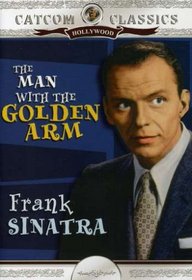| Actor: MAN WITH GOLDEN ARM Genres: Classics Sub-Genres: Classics Studio: Krb Music Format: DVD DVD Release Date: 03/31/2006 Release Year: 2006 Number of Discs: 1 SwapaDVD Credits: 1 Total Copies: 0 Members Wishing: 0 MPAA Rating: Unrated Subtitles: English |
Search - Man With Golden Arm on DVD
  | Man With Golden Arm Actor: MAN WITH GOLDEN ARM Genres: Classics UR 2006 Studio: Krb Music Release Date: 03/31/2006 |
Larger Image |
Movie DetailsSimilarly Requested DVDs
|
Movie ReviewsOtto Preminger's Dark Urban Poem Interplanetary Funksmanship | Vanilla Suburbs, USA | 12/01/2007 (5 out of 5 stars) "Before the advent of the French "New Wave," director Otto Preminger directed the highly stylized, realistic urban classic "The Man With the Golden Arm." Frank Sinatra was never consistently great as an actor, but his portrayal of heroin addict Frankie Machine is not only the best of his career, but one of the best for anybody's career, for that matter. Set in 1955, this was a pretty risky movie for its time, and was to drug addiction what Billy Wilder's 1945 "The Long Weekend" was to alcoholism: A no-holds-barred, unwhitewashed slice of reality.
Frankie's problem is that he wants to return to normalcy after being released from prison, and then a halfway house. Like the novelist says, "you write what you know," and likewise Frankie lives what he knows, and returns to his seedy Chicago neighborhood. From the moment of his uneventful return, normalcy -- his old life as a card dealer, his neurotic wife (Eleanor Parker) who feels too sorry for herself to help Frankie start clean with a new life, and a small-time heroin dealer, icily played by Darren McGavin -- tries to reel Frankie back into a dead-end routine and sink its hooks to keep him enslaved to his compulsions. Frankie tries to embark on a new career as a jazz drummer, which provides the movie with the motifs for its streetwise "crime jazz" soundtrack, written by Elmer Bernstein. But, the cycle of addiction sets in lightning-quick because Frankie's wife wants him to bring home the money dealing cards again, which puts him smack dab in the company of the lowlifes he most desparately needs to avoid. Back at dealing, the local heroin dealer could not give a whit about Frankie staying clean; He's desparate to get Frankie to take that one fix and hook another regular customer. Fortunately, Frankie finds salvation in the arms of Kim Novak, who was involved with Sinatra romantically at the time. Their relationship is a complex one, and Novak's empathy really comes through. Her hard-headed compassion in keeping Frankie away from a fix while he's sweating it out cold-turkey is riveting, because she's putting her own safety at risk. Even before modern theraputic terms like "in denial" were in vogue, we see Sinatra's character -- in the throes of his own addiction -- running down Novak's alcoholic boyfriend as a weakling who can't control his vices. It's beautifully handled, because the point is not to expose Frankie as a hypocrite, but to reveal his blindness to his own weaknesses. Frankie is a tragic hero of Shakesperian dimensions, but whose stage is set in a modern-day tenement. Visually, this film is very striking, and is edited so that the montage is in rapid-fire sequence during crucial scenes. It's intercut in the same fashion as Saul Bass' pioneering title cutouts; Bass would go on to become Hollywood's most recognizable title designer, his sequences dominated by iconic graphics in movies such as Preminger's "Anatomy of a Murder," "Advise and Consent" and Hitchcock's "Vertigo" and "Psycho." Of all Preminger's movies, this is the most cinematic. He would go on to use more laid-back camera setups and editing in movies like the one named above, and would break out into less intimate and more worldly settings with epics such as "The Cardinal" and "In Harm's Way." "The Man With the Golden Arm" catches Preminger at the top of his form as it does his cast. McGavin would never again be so intense, and only in "The Manchurian Candidate" for Sinatra and "Vertigo" for Novak would such powerful, commited and well-written performances again come their way." |











